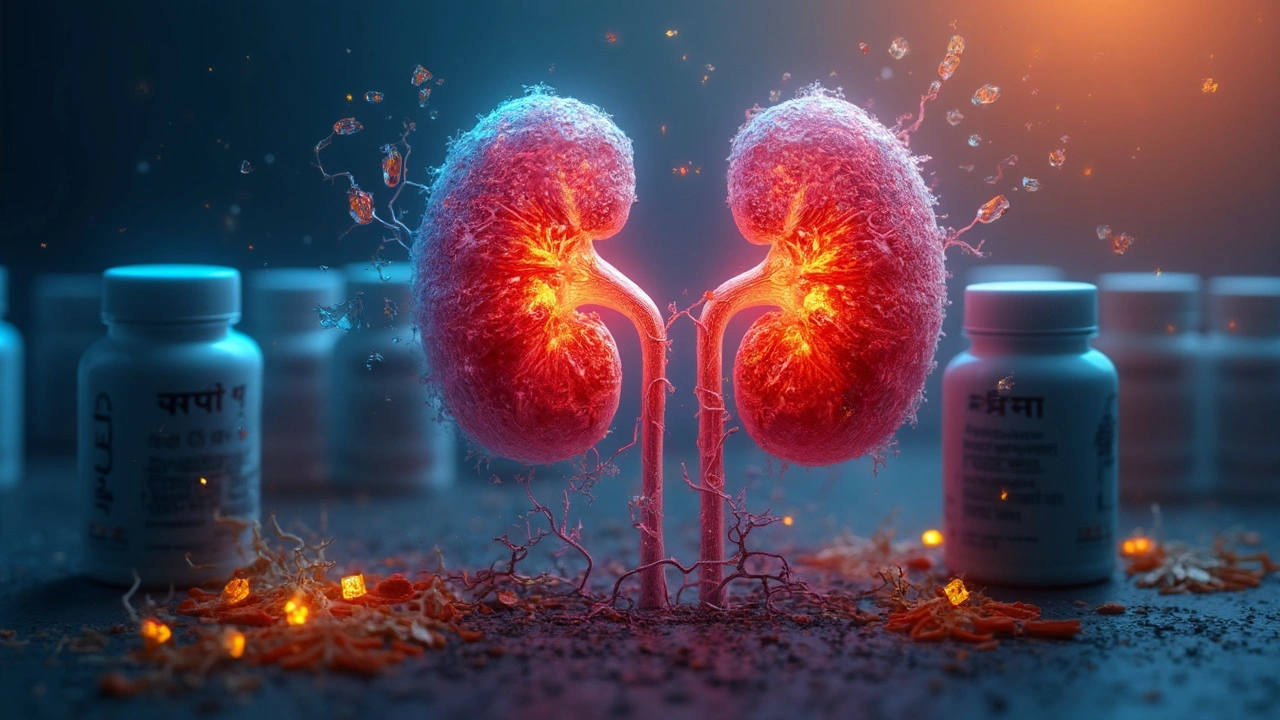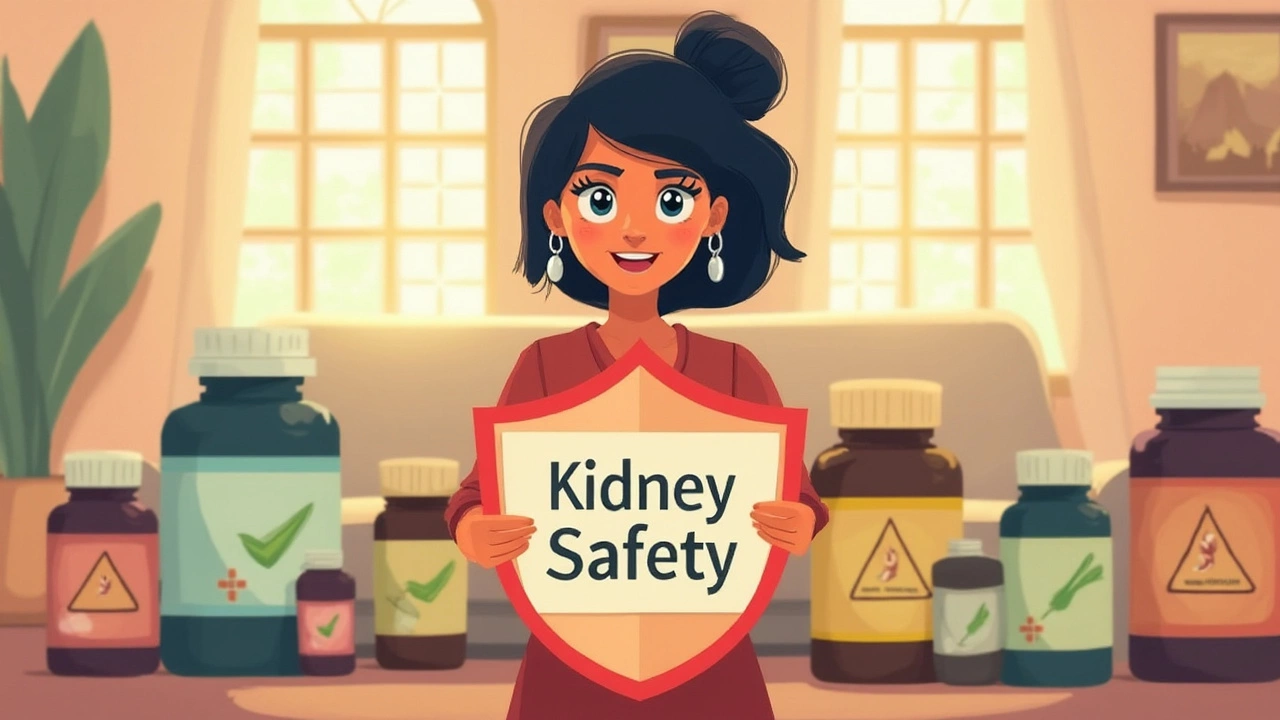Think popping a few extra vitamins is harmless? Not so fast—your kidneys might have something to say about it. These small but mighty organs deal with every pill you swallow, filtering out what your body doesn’t need. That means when you go overboard on certain vitamins, the kidneys end up doing more work—and sometimes the load is just too much.
Most folks know about watching salt or protein for kidney health, but vitamins rarely get the spotlight. Here’s the thing: both too much and the wrong mix can leave your kidneys struggling, especially if you’re mixing in herbal supplements. When kidneys get overloaded, waste can build up, making you feel tired, swollen, or even foggy-headed. It’s not just about what you eat, but what you pop from those colorful bottles.
If you take vitamins or herbal blends every day, especially the mega-dose ones, it pays to know which ones spell trouble for your kidneys. Don’t guess—knowing what’s hard on the kidneys is the first step to protecting them.
- Why Your Kidneys Care About Vitamins
- Vitamins That Can Harm Kidneys
- Herbal Supplements and Hidden Risks
- How to Use Vitamins Safely
- Myths, Truths, and Tips for Kidney Health
Why Your Kidneys Care About Vitamins
Your kidneys work like a water filter—constantly cleaning your blood and getting rid of what your body doesn't need. Every vitamin you take, whether it’s from food, pills, or herbal supplements, ends up passing through them. The kidneys sort the good stuff from the waste, then send the leftovers to your bladder so your body can flush them out.
But here’s the catch—not all vitamins act the same once they’re inside you. Some, like vitamin C and most B vitamins, dissolve in water. Your body takes what it needs and the extra gets peed out, no big deal—unless you take too much. Others, like vitamin D and vitamin A, are stored in fat, so they can slowly build up to dangerous levels, especially if your kidneys can’t keep up.
- If you have healthy kidneys, they can handle normal vitamin levels. It’s high doses or long-term use that start to cause trouble.
- Peeing out extra vitamins sounds easy, but if your kidneys are already struggling (from things like diabetes, high blood pressure, or age), they might not be able to keep up.
- Certain vitamins can form crystals or stones when there’s too much in your system, kicking off pain or even kidney damage.
Check out how your body handles vitamin overload:
| Vitamin | Type | How the Body Removes Extra |
|---|---|---|
| Vitamin C | Water-soluble | Filtered by kidneys, peed out—too much can form stones |
| Vitamin D | Fat-soluble | Stored in fat—overload stresses kidneys |
| Vitamin B6 | Water-soluble | Extra goes out in urine—very high doses can irritate kidneys |
| Vitamin A | Fat-soluble | Builds up over time—too much is toxic for kidneys |
The bottom line? Your kidneys have to deal with every supplement you swallow. Overdoing even healthy vitamins slows them down and can set you up for real health problems, especially if you’re already on herbal blends that add more for your kidneys to handle.
Vitamins That Can Harm Kidneys
Surprised to hear that some vitamins can mess with your kidneys? Most people don’t realize a few common ones can actually do real damage if you take too much. Let’s break down the worst offenders so you know what to watch for.
Kidneys have the big job of clearing out excess vitamins, especially the ones your body can’t store. Water-soluble vitamins usually get flushed out, but this system isn’t perfect—especially for folks taking mega-doses or who already have weak kidneys.
Here are the biggest troublemakers:
- Vitamin C: Your body can only use so much. Extra vitamin C turns into oxalate, which can stack up in the kidneys and form stones. Doses over 1,000 mg per day raise your risk fast—so no, loading up when you’ve got a cold isn’t harmless.
- Vitamin D: Too much vitamin D cranks up calcium in your blood, making it tough for kidneys to keep up. Calcium buildup can scar your kidneys and even cause stones. Doses over 4,000 IU daily for months can get you in hot water.
- Vitamin A: It’s fat-soluble, so your body stores the extra—which means it can pile up over time and damage your kidneys (and your liver). High-dose supplements or long-term use is risky, especially for folks with kidney problems already.
- Niacin (Vitamin B3): High doses (like what you find in some cholesterol-lowering supplements) can cause kidney dysfunction—even shut them down in rare cases.
- Vitamin E: Mega-doses aren’t common, but when they happen, they’ve been linked to kidney problems, especially in combo with other supplements.
Check out some real stats in the table below:
| Vitamin | Upper Safe Limit (Daily) | Kidney Risk |
|---|---|---|
| Vitamin C | 2,000 mg | Kidney stones, oxalate buildup |
| Vitamin D | 4,000 IU | Calcium overload, kidney damage |
| Vitamin A | 3,000 mcg | Storage toxicity, organ damage |
| Niacin (B3) | 35 mg | Kidney dysfunction at high doses |
| Vitamin E | 1,000 mg | Possible kidney/liver impact |
If you already have kidney issues, even lower amounts might be risky. That’s why doctors always run bloodwork before recommending supplements, especially these heavy-hitters. When in doubt, keep your doses close to what you get from food, not giant pills.

Herbal Supplements and Hidden Risks
Herbal supplements are everywhere, from fancy detox teas to supplements that promise extra energy or a better memory. The problem is, folks often think 'natural' means 'safe.' But your kidneys might disagree—especially if you're already loading up on vitamins too.
Here’s where things get tricky: tons of herbal blends contain vitamins stacked on top of the herbs. If you’re using multiple products or mixing brands, you can double up without realizing. This can put a serious strain on your kidneys, making a bad situation worse if you already have kidney problems or just take high doses for a long time.
Some of the most common herbal supplements tied to kidney issues include:
- High-dose Vitamin C blends, which can lead to kidney stones when combined with certain herbs.
- St. John’s Wort, because it can mess with medicines prescribed for kidney disease and ramp up side effects.
- Licorice root, which is bad news for blood pressure and can raise the risk of kidney injury when combined with other supplements.
- Herbal detox teas, especially those listing ‘laxative herbs’ like senna. These can cause dehydration, stressing out your kidneys even more.
Not convinced? The National Kidney Foundation warns that many herbal supplements can trigger or worsen kidney problems, especially if you already have even mild kidney disease. One study out of Taiwan looked at 2,000 adults taking herbal medicines and found about 10% had signs of kidney damage compared to only 2% who didn’t use these products—a big difference.
| Herbal Supplement | Potential Kidney Risk |
|---|---|
| St. John’s Wort | Interacts with kidney meds, can worsen toxicity |
| Licorice Root | Raises blood pressure, may trigger kidney damage |
| Vitamin C blends | Kidney stones if overused |
| Senna (Detox Teas) | Causes dehydration, increases strain |
Here’s the simple takeaway: check the labels, talk to your pharmacist or doctor, and don’t mix different products unless you’re sure it’s safe for your kidneys. ‘Natural’ isn’t always better for your organs, so treat herbal supplements with the same respect as any medicine. Your kidneys will thank you.
How to Use Vitamins Safely
When it comes to keeping your kidneys healthy, a little common sense goes a long way with vitamins. It's easy to think that more is better, but with some vitamins and herbal supplements, you could be making things harder for your body—especially if you go overboard or double up with different products.
First off, stick to the recommended daily value for each vitamin unless your doctor has told you otherwise. The "more is better" mindset is risky for fat-soluble vitamins like A, D, E, and K because your body hangs on to the extra, which means your kidneys have to process it later. Water-soluble ones like vitamin C and certain B vitamins can also add pressure if you take mega-doses—just because your body pees them out doesn't mean there's no risk, especially if your kidneys aren't in top shape.
Be picky about what you buy. Herbal supplements aren't always as pure as they look on the bottle. They sometimes sneak in extra vitamins or metals that can pile up in your system. Checking for reliable brands and certification marks (like USP or NSF) can help you dodge these hidden dangers.
- Don’t mix supplements that cover the same vitamins—what looks like a safe amount in one bottle can double or triple when you take others.
- Read the labels, not just the marketing claims. Watch for "proprietary blends" that don't list exact doses.
- If you have even mild kidney problems, talk to your doctor before starting anything new. This isn't overkill—high-dose vitamin D, C, or certain herbal mixes can mess with your bloodwork in ways you won't feel until it's a problem.
- Set a set time to take your vitamins, so you’re less likely to double-dose or forget. Consistency beats chaos here.
Here’s a handy snapshot of vitamins and the safe daily upper limits for healthy adults. Always check with your healthcare provider if you have kidney issues or take meds that affect your kidneys.
| Vitamin | Recommended Daily Value | Upper Safe Limit | Watch-Outs for Kidneys |
|---|---|---|---|
| Vitamin C | 90 mg (men), 75 mg (women) | 2,000 mg | Too much can cause kidney stones |
| Vitamin D | 600-800 IU | 4,000 IU | High doses may raise blood calcium, stress kidneys |
| Vitamin A | 900 mcg (men), 700 mcg (women) | 3,000 mcg | Can build up and harm kidneys/liver |
| B6 | 1.3-2 mg | 100 mg | High doses might hurt nerves and kidneys |
The bottom line? Focus on a balanced diet first and use supplements to fill gaps—don't treat them like a magic bullet. And when in doubt, talk it out with your doctor or a good pharmacist who isn’t trying to upsell you. Your kidneys will thank you in the long run.

Myths, Truths, and Tips for Kidney Health
Let’s clear up a few things—there’s a lot of bad info floating around about vitamins, kidneys, and herbal supplements. One big myth is that all vitamins are automatically safe just because they’re “natural.” Not true. Too much vitamin C can build up as oxalate and lead to kidney stones. High doses of vitamin A over time can mess with your kidneys’ filtration system. Even vitamin D, which gets recommended all the time, can be toxic to kidneys if you overdo it, especially with certain herbal supplements.
Another common line you’ll hear: “If you take extra vitamins, your body will just pee them out.” That only works with some water-soluble types like vitamin B and C, and even then, only in modest amounts—mega-dosing can have consequences. For fat-soluble vitamins (A, D, E, K), extra amounts stick around and your kidneys face the heat. And don’t fall for labels claiming herbal blends are always easy on your system. Some herbal ingredients can push your kidneys even harder, especially when mixed with big doses of vitamins.
If you’re looking for real talk, here are some straight-up tips that work for almost everyone:
- Be skeptical of “kidney cleanse” products and miracle supplements—they can actually do more harm than good if your kidneys are already struggling.
- Check the labels. Lots of herbal supplements sneak in vitamins without saying how much. Track your total daily intake, not just what you get from one bottle.
- Talk to your doctor or a pharmacist if you’re on meds or have any kidney problems already. Some vitamins interact with prescriptions or can make kidney issues worse.
- Don’t guess on dosages. Get bloodwork done if you’re taking supplements regularly, especially if you’ve had kidney trouble in the past.
- Natural isn’t always safe, and high-dose isn’t always better. Smaller, right-sized amounts are the safer bet with both vitamins and herbal supplements.
Bottom line: treat your kidneys with respect. They work 24/7, cleaning house for your whole body. You want to avoid giving them extra work, especially from sneaky dangers in the supplement aisle.
